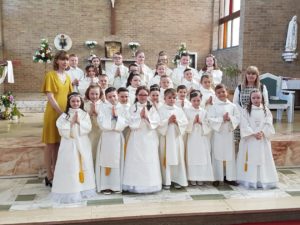St Michael’s Primary School takes a child-centred approach to planning pupils’ learning experiences and assessment is an integral part of this process. The use of the wellbeing indicators in developing a holistic understanding of our learners is an essential part of our practice. Learning experiences are planned carefully using the Experiences and Outcomes of Curriculum for Excellence and based on the seven principles of curriculum design. Taking account of the learning needs of their pupils, our staff employ a range of teaching strategies. Children will be encouraged to learn independently as well as co-operatively. They will carry out solo tasks, paired and trio based activities, participate in small group and large team based events. Learning will take place both within and outwith the classroom. Activities will always be purposeful; providing new learning experiences or opportunities to demonstrate knowledge and understanding by applying skills in new or unfamiliar contexts. They have opportunities to lead their learning within their classes and also through a range of well-planned activities outwith their class setting.
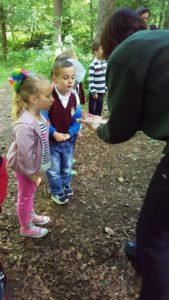
Our learning and teaching takes place within four different contexts:
Curriculum areas and subjects
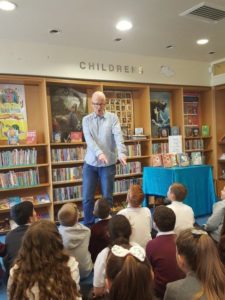
Our staff ensure that all pupils in St Michael’s Primary experience a Broad General Education as outlined in Curriculum for Excellence, “progressing through the Levels, as far as this is consistent with their learning needs and prior achievements.” (Education Scotland). This is their entitlement. This means that pupils will learn: Languages (English and French), Numeracy and Mathematics, Religious Education in Catholic Schools, Health and Wellbeing, Social Studies, Science, Technologies and Expressive Arts. By applying the principles of GIRFEC, staff ensure that all pupils experience an appropriate curriculum, enabling them to be successful in their learning journey. It is our duty to ensure that our pupils’ learning experiences develop their capacities for life.
Interdisciplinary Learning
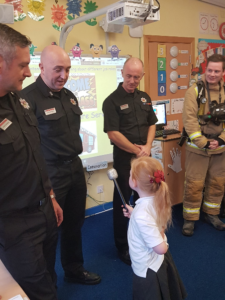
Our staff plan interdisciplinary learning (IDL) experiences for their pupils, enabling them to encounter and explore relevant links between different subjects. It also provides pupils with opportunities to apply skills that they have learned in new and unfamiliar contexts, providing staff with opportunities to assess the depth of children’s understanding. In line with Building the Curriculum 3, our staff achieve this through a range of approaches, for example, through one-off projects or longer courses of study and providing opportunities for mixed stage learning which is interest based. IDL projects greatly inspire and motivate learners and provide opportunities for pupils to showcase their learning to their parents and families. These celebrations of learning give further opportunities for our pupils to develop their skills and receive very positive feedback from families. Mixed stage learning has been highly successful within our infant department and will be extended to other areas of the school.
Ethos and life of the school

As a community of faith we have “an inclusive ethos which aims to honour the life, dignity and voice of each person, made in the image of God.” (Charter for Catholic Schools in Scotland). By our actions we promote the Gospel values of love, sacrifice, faithfulness, humility, justice, compassion and tolerance. As a nurturing school, the application of the principles of nurture in our daily practice firmly supports the creation of an inclusive ethos and the promotion of the Gospel values. Positive relationships are at the heart of our school.
Our partnership with Litchenza Primary in Malawi helps us to develop global citizenship. Our Global Citizenship Group has a key role to play in the leadership and development of this.
Our staff ensure that pupils are provided with opportunities to contribute to the school and its wider community, and actively encourage them to do so. As a Rights Respecting School, the voice of each person is valued and each person has the opportunity to contribute to decision making processes which lead to school improvement. One of the ways in which we achieve this is by all pupils being members of Pupil Voice Groups. These groups have clear mission statements which reflect the focus of the group, its impact for its individual members and for the whole school. Our pupils are also regularly consulted through Learning Conversations and pupil audits.
Pupils are provided with leadership opportunities within classes and throughout the school, developing positive attributes and skills required to be responsible citizens. They share their talents with others.
Opportunities for personal achievement
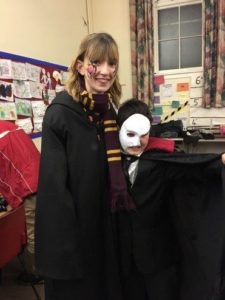
Planning for pupils’ learning ensures that there opportunities for pupils to experience personal achievement.
In St Michael’s Primary our staff are dedicated to providing pupils with a range of opportunities for personal achievement outwith their daytime classroom experience. This is evident through the vast range of after school and lunchtime clubs that are available. Opportunities are planned so that pupils of all age groups are having these experiences.
Our school works in close partnership with Brnardo’s, CLD, Active Schools, Inverclyde Music Service, Library Services and Clyde Muirshiel Rangers Service to further extend the opportunities available to our pupils.
We celebrate the achievements of our pupils through assemblies, newsletters, Twitter, our website and the local press. As we continue to celebrate pupils’ achievements we are seeking ways for parents and carers to share their children’s achievements from outwith school. Our learners are encouraged to record their personal achievements in their Learning Journals which they complete in class on a weekly basis.
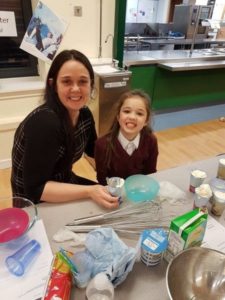
Spiritual, Social, Moral and Cultural Values – Religious and Moral Education
The Education (Scotland) Act 1980 imposes a statutory duty on local authorities to provide “Religious Observance” in Scottish schools. This is defined in a national R.O. Review Group report published in 2004 as comprising: “community acts which aim to promote the spiritual development of all members of the school’s community and express and celebrate the shared values of the school community”.
In a letter of guidance issued by the Scottish Government in February 2011, it is acknowledged that Catholic schools take a distinctive approach to the provision of Religious Observance:
Scottish Government Ministers welcome the tradition that, in Roman Catholic denominational schools, Catholic Liturgy will largely shape the nature and frequency of religious observance activities in the classroom and in the wider school community. So, at times, children and young people will be invited to participate in, and sometimes to lead, prayer and reflection in classrooms and at assemblies. At other times, to honour particular occasions or feasts, chaplains will lead school communities in the celebration of Mass and other forms of liturgical celebration.[1]
Catholic schools follow the customs and practices of the Church in order to nourish the spirituality and faith of pupils and staff. Our Catholic tradition is enriched by ancient rites, prayers and devotions which help young people to become aware of, and show reverence to, the sacred presence of the living God, Father, Son and Holy Spirit. Guided by this tradition, we celebrate various seasons and special feast days to honour God, Mary his Mother and the Saints.
Pupils are invited to pray with their teachers at times in classrooms and assemblies, as well as in liturgical services. Usually a classroom will display a Crucifix on the wall; in some classrooms and other areas of the school, a sacred space will feature a copy of the Bible and will be decorated with signs and symbols that reflect the changing seasons of the Church Calendar Year i.e., Advent, Christmas, Lent, Easter and Pentecost.
This regular practice of Prayer is complemented by religious services conducted, sometimes as part of an Assembly, to mark special occasions, eg, the distribution of Ashes on Ash Wednesday, the seasons of Advent or Lent. To mark special Feast Days and Holy Days of Obligation, Holy Mass will be celebrated by the school chaplain, with the school community, in school buildings or in local parishes. Some pupils, at certain stages, may be able to participate in retreats and pilgrimages to places of special significance within the Catholic tradition.
While Religious Education is governed by separate Church guidance, it is complemented by Religious Observance practices and, together, these experiences help pupils to develop their understanding of the Catholic faith, to experience opportunities for spiritual growth and to commit to beliefs, values and actions in a positive response to God’s invitation to faith.
In terms of pupil participation in R.O. Scottish Government guidance makes it clear that it makes an important contribution to pupils’ development and that it promotes the ethos of a school by bringing pupils together and creating a sense of community. However, it also makes clear that parents have the right to withdraw children from participation in religious observance and that this right should always be made known to parents and their wishes respected. The Scottish Government also recognises that:
Where a parent chooses a denominational school for their child’s education, they choose to opt in to the school’s ethos and practice which is imbued with religious faith and religious observance. In denominational schools, it is therefore more difficult to extricate a pupil from all experiences which are influenced by the school’s faith character.
The Catholic Church has designed a new programme, “God’s Loving Plan”, which will be used to deliver our sex education programme. Sex and relationship education is an integral part of a school’s health education and RE programme. It focuses on the physical, emotional, moral and spiritual development of all children. Teachers are central to the delivery of sex education from Primary 1-7 and work in partnership with parents/carers and appropriate health professionals.
Parents/Carers are fully informed and consulted on the content and purpose of sex and relationship education in schools, and have the opportunity to raise concerns with school staff. On an occasion where a parent/carer wishes to exercise the right to withdraw his/her child from sex and relationship education or any aspect of religious education, they should discuss this with school staff (as per Inverclyde’s policy “Sexual Health and Relationship Education”) and alternative arrangements will be made.
Parents from ethnic minority religious communities may request that their children be permitted to be absent from school in order to celebrate recognised religious events. Only written requests detailing the proposed arrangements will be considered. Appropriate requests will be granted on not more than three occasions in any one school session and the pupil noted as an authorised absentee in the register.
In St Michael’s School we have very strong links between the school, home and parish. Canon David, as our school chaplain, leads us in worship and regularly visits our school. We work closely together to support all learners in their faith journey.
